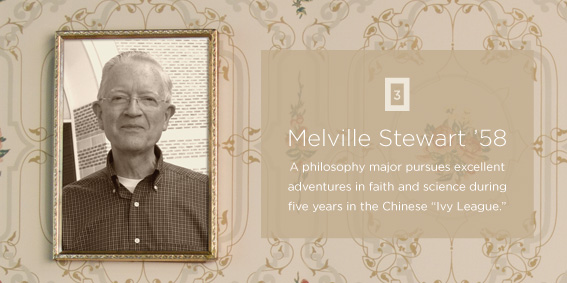STILLPOINT Archive: last updated 12/07/2010

Of Superstrings and Stem Cells
Back in 1958, when he was a senior philosophy major at Gordon studying under Lloyd Dean, Grady Spires and Donald Tweedie, Melville Stewart never dreamed that 50 years later he’d be a Templeton visiting philosopher at five of China’s top universities—or that he’d be author/editor of 19 books, 17 of them still in print.
The most recent of these, Science and Religion in Dialogue (Wiley-Blackwell, 2010), grew directly out of those five years in China, as Mel and many other philosophers and scientists from North America and China wrestled with issues including Big Bang cosmology, evolution, intelligent design, and the God gene hypothesis. Stem cell research, bioethics and neuroscience were also explored, along with topics that delve into the deeper realm of physics, such as the general and special theories of relativity, dark energy, dark matter, the multiverse hypothesis and superstring theory.
The two volumes of Science and Religion in Dialogue record a number of remarkable East-West encounters. “I’m utterly convinced that God was opening doors,” Mel says. It was a different sort of mission field than he might have envisioned back in the 1950s as a Gordon student on the Fenway. But it became clear that his vocation was to bear witness to his faith in the academy, in the international arena of ideas.
Along with his wife of 50 years, Donna, Mel visited a list of universities that comprise a Chinese “Ivy League,” beginning in 2005 with Wuhan University in Wuhan, a city to the south of Beijing. After a successful first conference, Mel proposed four more years of the series to the Templeton Foundation.
In 2006 Fudan University in Shanghai hosted the series. In 2007 Shandong University in Jinan was center stage. The Stewarts’ next stay, in 2008, was at the Shao Yuan Hotel at Peking University, China’s model for scholarship and research. The final series was held in 2009 at Tsinghua University, viewed as China’s “MIT.”
“The Chinese term for dialogue, duihua, suggests a ‘conversation, a fitting responsiveness between two persons,’” Mel writes, in his “Introduction to Volume One.” “This sense of dialogue . . . is a factor that helps promote a central end contemplated in the Science and Religion Series . . . It has been refreshing and encouraging from the start to observe that each of the series held in China has evidenced this sort of response—faculty and students listening to each presenter with the attitude that the presentation deserves to be heard.”
Though he and Donna have lived through many cultural changes and challenges, Mel insists that their core sense of mission has remained steady. “The task of giving a reason for the hope within us has always served as a biblical mandate.” he says. “We just responded to opportunities to share our faith.”
Melville Stewart, M.Div., Ph.D., is professor of philosophy emeritus at Bethel University in Saint Paul, Minnesota.
[email protected]
NEXT: Mark Shaw